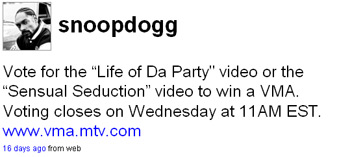Two interesting articles have come out recently, discussing tips and techniques for people interested in using Twitter as a business or marketing tool. As I work for an advertising agency that specializes in leveraging new technologies (such as Facebook applications) to market towards a younger, more tech-savvy audience, this is something I was particularly interested in.
In his article 50 Ideas on Using Twitter for Business, blogger and 10-year veteran of the ‘Net industry Chris Brogan writes:
We really can’t deny the fact that businesses are testing out Twitter as part of their steps into the social media landscape. You can say it’s a stupid application, that no business gets done there, but there are too many of us (including me) that can disagree and point out business value. I’m not going to address the naysayers much with this. Instead, I’m going to offer 50 thoughts for people looking to use Twitter for business. And by “business,†I mean anything from a solo act to a huge enterprise customer.
In his article, Brogan runs you through first steps, ideas on what to tweet about, potential pitfalls and criticisms you may encounter, and some possible positives you can throw back at the naysayers.
In a WebProNews article from today titled The Poetics of Professional Tweeting, blogger Jason Lee Miller takes a step back and looks at Twittering for business in a more abstract sense, discussing what’s working and what’s not. He writes:
Over at Wired.com’s “Listening Post†blog, Scott Thill bemoans the lack of “penetrating insights†from the band REM’s Twitter feed before noting the un-Snoopness of Snoop Dog’s. Some PR poser, someone completely out of touch of with the bow-wow-wow-yippie-yo-yippie-yay-ishness of Snoop spends 140 characters telling followers to pick up a copy of the new album at their local Wal-Mart.
Not very Snoopish, at all.
While Twitter wasn’t created with the intention of becoming a business tool (to my knowledge, anyway), it was only a matter of time before marketers would start looking for a way to leverage it to reach out to customers (and potential customers). While Brogan offers specific suggestions on what to tweet about, Miller cautions potential business-tweeters about remaining true – sound advice for marketers in ANY medium.
Another interesting article comes from Mack Collier of Search Engine Guide, which brings up an interesting point of what happens when companies try to use Twitter (or other social networking tools) on their own terms, instead of as the rest of us use them. His example, titled Worst Example of a Company Twittering?, shows an interesting scenario involving DirectTV.
I don’t know what the future holds for businesses and Twitter, but I do know that people can tell when they’re being played, and when your attempts to seem hip and young and cool come across as phony and contrived. Like every other aspect of successful marketing, the message you’re sending and the venue by which you do it should feel authentic or it just won’t fly.
